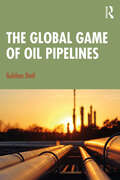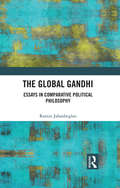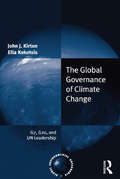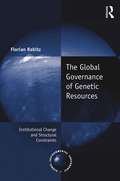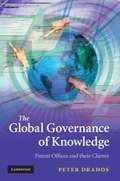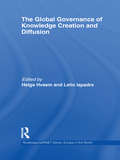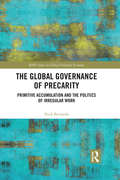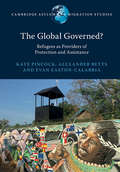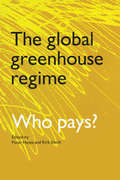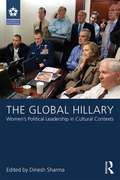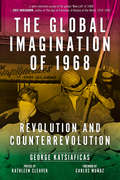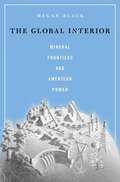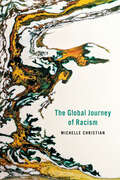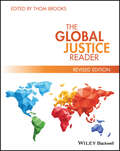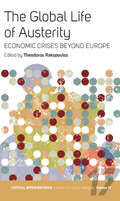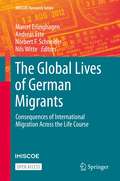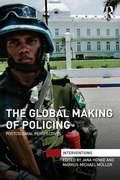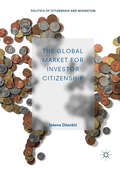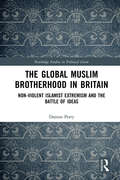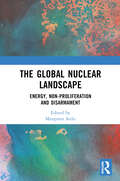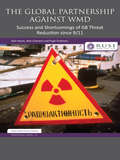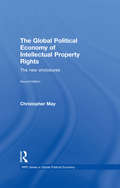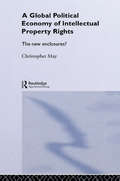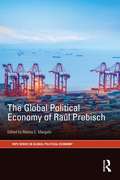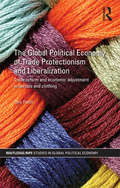- Table View
- List View
The Global Game of Oil Pipelines
by Gulshan DietlOil has long been and will continue to be at the centre of the global economy. This book explores the oil trade, energy (geo)politics, and new trends in regionalising or globalising the oil industry in the new era of international relations and economic competition. Energy pipelines carrying oil and gas from the well-head to the market, generally run through two or more states; and often from one continent to the other. This book maps the oil flowing through international and intercontinental pipelines and unravels the political, commercial and technological considerations behind the mapping of oil routes and forging of trade ties between nation-states. Through case studies from the major oil-exporting regions like Saudi Arabia, Iraq, Iran, the USA, Canada, and Russia, it analyses the changing trends in their policies around oil trade, bilateral relations, energy, and security. It also considers the environmental protests around the continued dependency on oil, the teapot refineries under the Islamic State, investments, oil lobbies and insurrections to understand the broad picture of shifting regional and geopolitical realities and the scramble for vital resources. This comprehensive book will be of interest to students of the geopolitics of energy, international relations, security and strategic studies, energy studies as well as the media and with policy makers.
The Global Gandhi: Essays in Comparative Political Philosophy
by Ramin JahanbeglooThis book is a comparative study of Gandhi’s philosophy and analyzes his relevance to modern political thought. It traces the intellectual origins of Gandhi’s nonviolence as well as his engagement with Western thinkers – ancient as well as his contemporaries. The author discusses Gandhi’s exchanges with eminent thinkers like Tolstoy and Thoreau, and looks at his vision of pluralism, democracy, and violence through the lens of philosophers like Hannah Arendt, Isaiah Berlin, and Cornelius Castoriadis. Further, it explores Gandhi’s association with Abdul Ghaffar Khan and the Khilafat Movement. Finally, the book examines Gandhian thought in the light of his global followers like Martin Luther King Jr and Nelson Mandela. An invaluable resource for the contemporary mind, this book will be of great interest to scholars and researchers of politics, political thought, Gandhi studies, and philosophy.
The Global Governance of Climate Change: G7, G20, and UN Leadership (Global Environmental Governance)
by John J. Kirton Ella KokotsisClimate change control has risen to the top of the international agenda. Failed efforts, centred in the United Nations, to allocate responsibility have resulted in a challenge now reaching crisis stage. John J. Kirton and Ella Kokotsis analyse the generation and effectiveness of four decades of intergovernmental regimes for controlling global climate change. Informed by international relations theories and critical of the prevailing UN approach, Kirton and Kokotsis trace the global governance of climate change from its 1970s origins to the present and demonstrate the effectiveness of the plurilateral summit alternative grounded in the G7/8 and the G20. Topics covered include: - G7/8 and UN competition and convergence on governing climate change - Kyoto obligations and the post-Kyoto regime - The role of the G7/8 and G20 in generating a regime beyond Kyoto - Projections of and prescriptions for an effective global climate change control regime for the twenty-first century. This topical book synthesizes a rich array of empirical data, including new interview and documentary material about G7/8 and G20 governance of climate change, and makes a valuable contribution to understanding the dynamics of governing climate change. It will appeal to scholars, researchers, and policy makers interested in the dynamics behind governance processes within the intergovernmental realm.
The Global Governance of Genetic Resources: Institutional Change and Structural Constraints (Global Environmental Governance)
by Florian RabitzMulti-institutional governance architectures are increasingly common in world politics, yet how do they evolve over time? This book develops a fresh conceptual approach by distinguishing two main types of institutional change and by proposing the strategic context within which governments make decisions regarding international cooperation as the main driving factor. Applying this theoretical framework to the case of genetic resources, it shows how the scope for change has persistently been circumscribed by asymmetries in the global biotechnology sector. Taking a broad view of the underlying technological, legal and economic factors, the book analyzes the formation of international regimes linking access to genetic resources to the fair and equitable sharing of the benefits arising out of their utilization. Covering negotiations in the areas of seeds, intellectual property rights, pandemic influenza viruses and marine genetic resources, the author shows how governments have persistently faced the problem of ensuring cooperation among actors with widely differing interests. This led them to opt for a strategy of institutional layering, whereby new international instruments are gradually built upon pre-existing ones. In addition to giving a comprehensive overview of the international governance of Access and Benefit-sharing within the wider context of modern biotechnology, the argument developed here enables a new perspective for studying institutional change in multi-institutional governance architectures.
The Global Governance of Knowledge
by Peter DrahosPatent offices around the world have granted millions of patents to multinational companies. Patent offices are rarely studied and yet they are crucial agents in the global knowledge economy. Based on a study of forty-five rich and poor countries that takes in the world's largest and smallest offices, Peter Drahos argues that patent offices have become part of a globally integrated private governance network, which serves the interests of multinational companies, and that the Trilateral Offices of Europe, the USA and Japan make developing country patent offices part of the network through the strategic fostering of technocratic trust. By analysing the obligations of patent offices under the patent social contract and drawing on a theory of nodal governance, the author proposes innovative approaches to patent office administration that would allow developed and developing countries to recapture the public spirit of the patent social contract.
The Global Governance of Knowledge Creation and Diffusion (Routledge/GARNET series)
by Helge Hveem Lelio IapadreThere is an increasing scientific and political sensibility for questions regarding the "governance of a knowledge society" and the societal benefits and problems of a "knowledge economy". The Global Governance of Knowledge provides a survey and analysis of international agreements and institutions, global and regional, which regulate the creation and dissemination of knowledge. The volume utilises case studies and a comparative country / thematic approach to prove a comprehensive survey of the regulation and governance of knowledge flow, research and innovation. By identifying activities creating new knowledge, such as education and migration, it demonstrates how knowledge regulation and diffusion works in practice and policy. The book will be of interest to students and scholars of globalization, international relations and policy regulation.
The Global Governance of Precarity: Primitive Accumulation and the Politics of Irregular Work (RIPE Series in Global Political Economy)
by Nick Bernards‘Standard’ employment relationships, with permanent contracts, regular hours, and decent pay, are under assault. Precarious work and unemployment are increasingly common, and concern is also growing about the expansion of informal work and the rise of ‘modern slavery’. However, precarity and violence are in fact longstanding features of work for most of the world’s population. Lamenting the ‘loss’ of secure, stable jobs often reflects a strikingly Eurocentric and historically myopic perspective. This book argues that standard employment relations have always co-existed with a plethora of different labour regimes. Highlighting the importance of the governance of irregular forms of labour the author draws together empirical, historical analyses of International Labour Organisation (ILO) policy towards forced labour, unemployment, and social protection for informal workers in sub-Saharan Africa. Archival research, extensive documentary research and interviews with key ILO staff are utilised to explore the critical role the organization’s activities have often played in the development of mechanisms for governing irregular labour. Addressing the increasingly widespread and pressing practical debates about the politics of precarious labour in the world economy this book speaks to key debates in several disciplines, especially IPE, global governance, and labour studies. It will also be of interest to scholars working in development studies and critical political economy.
The Global Governed?: Refugees as Providers of Protection and Assistance (Cambridge Asylum and Migration Studies)
by Alexander Betts Kate Pincock Evan Easton-CalabriaWhen refugees flee war and persecution, protection and assistance are usually provided by United Nations organisations and their NGO implementing partners. In camps and cities, the dominant humanitarian model remains premised upon a provider-beneficiary relationship. In parallel to this model, however, is a largely neglected story: refugees themselves frequently mobilise to create organisations or networks as alternative providers of social protection. Based on fieldwork in refugee camps and cities in Uganda and Kenya, this book examines how refugee-led organisations emerge, the forms they take, and their interactions with international institutions. Developing an original theoretical framework based on the concept of 'the global governed', the book shows how power and hierarchy mediate the seemingly benign notion of protection. Drawing upon ideas from anthropology and international relations, it offers an alternative vision for more participatory global governance, of relevance to other policy-fields including development, humanitarianism, health, peacekeeping, and child protection.
The Global Greenhouse Regime: Who Pays?
by Kirk R. SmithEffective policies to prevent global warming and climatic change are urgently required by the world community. However, international negotiations on this issue repeatedly come up against the problems of allocating responsibility for the greenhouse effect, and bearing the costs of remedying the situation.;This volume offers a multidisciplinary response to the challenge. It presents the scientific, economic and political issues and goes on to describe the policy options available. The different ways of determining responsibility for greenhouse gases and calculating obligations to pay for hazards to the environment are analyzed. The contributors examine the implications for various countries, while a concluding chapter explores climatic change negotations - what is at stake, and for whom.
The Global Hillary: Women's Political Leadership in Cultural Contexts
by Dinesh SharmaEssays in this collection provide insight into Clinton’s leadership style, particularly her use of American "smart power" in foreign policy, while examining her impact on the continuing worldwide struggle for women’s rights.
The Global Imagination of 1968: Revolution and Counterrevolution
by Kathleen Cleaver George Katsiaficas Carlos MuñozWith discussions of more than 50 countries, Katsiaficas articulates an understanding of the 1960s' social struggles not bound by national or continental divides nor focused on famous individuals. From the Prague revolt against Soviet communism to the French May uprising, the Vietnam Tet offensive, African anticolonial insurgencies, the civil rights movement, and campus eruptions in Latin America, Yugoslavia, and the United States, this book portrays the movements of the '60s as intuitively tied together. Student movements challenged authorities in almost every country, giving the insurgency a global character. As uprisings occur with increasing frequency in the 21st century, the lessons of 1968 provide useful insights for future struggles.
The Global Interior: Mineral Frontiers and American Power
by Megan BlackMegan Black argues that the U.S. Department of the Interior, known for managing domestic natural resources and operating public parks, constantly supports and projects American power abroad. In the guise of sharing expertise globally, Interior has helped the U.S. maintain key benefits of empire without the burden of playing the imperialist villain.
The Global Journey of Racism
by Michelle ChristianIn The Global Journey of Racism, Michelle Christian provides a unified narrative of how the world's racial hierarchies came to be. Christian's story begins before the Ku Klux Klan, Nazi Germany, and South African Apartheid, tracing the historical lineage of white supremacy to the expansion of western, European empire. She uncovers the vast network of legal, political, economic, and social mechanisms—most potently, enslavement—that made up the original design for racialized knowledge, capitalist systems, and colonial management. Contemporary manifestations of this design may have new rhythms, beats, and faces, but they are all rooted in the modern hierarchy of global white supremacy and global anti-Blackness. Christian brings imperial history into conversation with the present, and places the racial mechanisms at work in distinct nations alongside each other, advancing a novel analysis of the global racial system. In doing so, she responds to scholarship on race and racism that emphasizes cultural specificity, and asserts the dominance of a modern world that, despite appeals to the contrary, remains brazenly, and without question, racist.
The Global Justice Reader
by Thom BrooksA unique compendium of foundational and contemporary writings in global justice, newly revised and expanded The Global Justice Reader is the first resource of its kind to focus exclusively on this important topic in moral and political philosophy, providing an expertly curated selection of both classic and contemporary work in one comprehensive volume. Purpose-built for course work, this collection brings together the best in the field to help students appreciate the philosophical dimensions of critical global issues and chart the development of diverse concepts of justice and morality. Newly revised and expanded, the Reader presents key writings of the most influential writers on global justice, including Thomas Hobbes, Immanuel Kant, John Stuart Mill, Martha C. Nussbaum, and Peter Singer. Thirty-nine chapters across eleven thematically organized sections explore sovereignty, rights to self-determination, human rights, nationalism and patriotism, cosmopolitanism, global poverty, women and global justice, climate change, and more. Features seminal works from the moral and political philosophers of the past as well as important writings from leading contemporary thinkers Explores critical topics in current discourses surrounding immigration and citizenship, global poverty, just war, terrorism, and international environmental justice Highlights the need for shared philosophical resources to help address global problems Includes a brief introduction in each section setting out the issues of concern to global justice theorists Contains complete references in each chapter and a fully up-to-date, extended bibliography to supplement further readingsThe revised edition of The Global Justice Reader remains an ideal textbook for undergraduate and graduate courses in global justice and human rights, cosmopolitanism and nationalism, environmental justice, and social justice and citizenship, and an excellent supplement for general courses in political philosophy, political science, social science, and law.
The Global Life of Austerity: Comparing Beyond Europe (Critical Interventions: A Forum for Social Analysis #17)
by Theodoros RakopoulosAusterity and structural adjustment programs are just the latest forms of neoliberal policy to have a profoundly damaging impact on the targeted populations. Yet, as the contributors to this collection argue, the recent austerity-related European crisis is not a breach of erstwhile development schemes, but a continuation of economic policies. Using historical analysis and ethnographically-grounded research, this volume shows the similarities of the European conundrum with realities outside Europe, seeing austerity in a non-Eurocentric fashion. In doing so, it offers novel insights as to how economic crises are experienced at a global level.
The Global Lives of German Migrants: Consequences of International Migration Across the Life Course (IMISCOE Research Series)
by Nils Witte Marcel Erlinghagen Andreas Ette Norbert F. SchneiderBased on the German case, this open access book highlights the increasing flows of migration and the internationalisation of individual life courses. It analyses the experiences of migration across four central domains - employment and income, partners and families, health and wellbeing, as well as friends and social participation - which potentially have far-reaching consequences for social inequalities and life chances. The book showcases results from an innovative probability sample that is representative of German emigrants who recently moved abroad and remigrants who recently returned from abroad and compares their international experiences with the sedentary population in Germany. Stays abroad, whether temporary or permanently, have become the new normal for increasing numbers of people from highly developed welfare states. Unnoticed from mainstream migration studies, these countries are today not only major immigration countries but also important sources of international mobility. By providing an empirically founded prism of the global lives of German migrants, this book is a valuable resource for students and researchers of migration, social inequality, and the life course and provides practitioners with insights into these regularly overlooked aspects of international migration.
The Global Making of Policing: Postcolonial Perspectives (Interventions)
by Markus-Michael Müller Jana HönkeThis edited volume analyses the global making of security institutions and practices in our postcolonial world. The volume will offer readers the opportunity to gain a deeper understanding of the global making of how security is thought of and practiced, from US urban policing, diaspora politics and transnational security professionals to policing encounters in Afghanistan, Palestine, Colombia or Haiti. It critically examines and decentres conventional perspectives on security governance and policing. In doing so, the book offers a fresh analytical approach, moving beyond dominant, one-sided perspectives on the transnational character of security governance, which suggest a diffusion of models and practices from a ‘Western’ centre to the rest of the globe. Such perspectives omit much of the experimenting and learning going on in the (post)colony as well as the active agency and participation of seemingly subaltern actors in producing and co-constituting what is conventionally thought of as ‘Western’ policing practice, knowledge and institutions. This is the first book that studies the truly global making of security institutions and practices from a postcolonial perspective, by bringing together highly innovative, in-depth empirical cases studies from across the globe. It will be of particular interest to students and scholars interested in International Relations and Global Studies, (critical) Security Studies, Criminology and Postcolonial Studies.
The Global Market for Investor Citizenship (Politics of Citizenship and Migration)
by Jelena DžankićThis book presents a systematic study of the history, theory and policy of investor citizenship and residence programmes. It explores how states develop new rules of joining their community in response to globalisation and highlights the tension between citizenship policies aimed at migrant integration and those, such as the sale of passports, which create ‘long-distance citizens’. Individual chapters offer insights in the historical relationship between citizenship, money and property; discuss arguments that support and counter the practice of the sale of citizenship; and examine the interests and strategies of the different actors—states, companies, individuals—that constitute the ‘supply’ and ‘demand’ sides of the burgeoning citizenship industry. The book provides a global overview of the market for investor citizenship as well as a separate policy analysis of the sale of citizenship and residence in the European Union.
The Global Muslim Brotherhood in Britain: Non-Violent Islamist Extremism and the Battle of Ideas (Routledge Studies in Political Islam)
by Damon L. PerrySince 2011, with the British Government’s counter-radicalisation strategy, Prevent, non-violent Islamist groups have been considered a security risk for spreading a divisive ideology that can lead to radicalisation and violence. More recently, the Government has expressed concerns about their impact on social cohesion, entryism, and women’s rights. The key protagonists of non-violent Islamist ‘extremism’ allegedly include groups and individuals associated with the Muslim Brotherhood and Jama’at-i-Islami. They have been described as part of the ‘global Muslim Brotherhood’, but do they constitute a singular phenomenon, a social movement? This book shows that such groups and individuals do indeed comprise a movement in Britain, one dedicated to an Islamic ‘revival’. It shows how they are networked organisationally, bonded through ideological and cultural kinship, and united in a conflict of values with the British society and state. Using original interviews with prominent revivalist leaders, as well as primary sources, the book also shows how the movement is not so much ‘Islamist’ in aspiring for an Islamic state, but concerned with institutionalising an Islamic worldview and moral framework throughout society. The conflict between the Government and the global Muslim Brotherhood is apparent in a number of different fields, including education, governance, law, and counterterrorism. But this does not simply concern the direction of Government policy or the control of state institutions. It most fundamentally concerns the symbolic authority to legitimise a way of seeing, thinking and living. By assessing this multifaceted conflict, the book presents an exhaustive and up-to-date analysis of the political and cultural fault lines between Islamic revivalists and the British authorities. It will be useful for anyone studying Islam in the West, government counter-terrorism and counter-extremism policy, multiculturalism and social cohesion.
The Global Nuclear Landscape: Energy, Non-proliferation and Disarmament
by Manpreet SethiLike shifting sands of a desert, the global nuclear landscape changes every few years across its three main constituents - nuclear energy, non-proliferation and disarmament. Each of these has seen phases of cautious optimism, deep scepticism and outright pessimism over the last two decades. This book offers a bird’s eye view on all the three, even as the individual authors offer a worm’s eye view on each specific topic within the larger ambit. The first section of the book examines developments in the nuclear energy sector. A broad-brush scan of the contemporary drivers and challenges for nuclear energy at a global level, as also that of India, reveals a positive trend line. There is also cautious optimism around the concept, developments and prospects of small modular reactors. It remains to be seen how effectively and quikcly licensing and regulation issues are resolved for the new concepts to become commericially viable. The second part of the book is devoted to non-proliferation. Vertical nucluear and missile proliferation amongst nuclear armed states, and horizontal proliferation cases of Iran and possibilities in East Asia are considered. Nuclear terrorism and the state of the NPT are also examined. Collectively, these issues reflect a mood of pessimism on non-proliferation at this juncture. Neither is there much to cheer on nuclear disarmament. The last section of the book examines the consequences of use of nuclear weapons, concepts of CBMs and arms control, and recent disarmament initiatives. A tentative exploration of the prospects of disarmament in the wake of Russia-Ukraine conflict is also undertaken. A hope that good sense will prevail, and fear that it might not, seem to coexist at this moment. It is in India's interest to proactively shape the landscape across these three elements. The book seeks to provide the basis to do so.
The Global Partnership Against WMD: Success and Shortcomings of G8 Threat Reduction since 9/11 (Whitehall Papers)
by Wyn Q. Bowen Alan Heyes Hugh ChalmersThe 9/11 terrorist attacks prompted a new urgency in efforts to deal with chemical, biological, radiological and nuclear proliferati on. The potential acquisition and use by terrorist groups of such weaponry was suddenly a much increased threat. The G8 Global Partnership against the Spread of Weapons and Materials of Mass Destruction subsequently encouraged some twenty-two countries and the European Union to pledge up to $20 billion to address this challenge. The creation of the Global Partnership was the first time so many countries agreed to collaborate on a range of non-proliferation, security and nuclear safety programmes, as well as commit such an amount of resources to them. Based on extensive primary research, this Whitehall Paper assesses the success and shortcomings to date of the Global Partnership, and suggests how the mechanism can be bolstered and taken forward.
The Global Political Economy of Intellectual Property Rights, 2nd ed: The New Enclosures (RIPE Series in Global Political Economy #No.3)
by Christopher MayThe first edition established itself as one of the leading books to situate the issue of intellectual property within the discipline of International Political Economy (IPE). Since its publication, intellectual property has continued to rise up the global agenda, reflecting expanding interest in the area among policy-makers and advocacy groups, linked to the increasingly fraught politics of the global governance of IPRs. Significantly revised and updated to take account of developments within the World Trade Organization and the World Intellectual Property Organization, this edition incorporates the author’s recent research on IPRs. It retains the theoretical and analytical elements of the first edition, whilst offering students and researchers a detailed analysis of how intellectual property is politically constructed, and how it is linked to the economics of knowledge and information in the contemporary global political economy. Rapidly-developing issues addressed in the work include: arguments around the implementation of the Agreement on Trade Related Aspects of IPRs (TRIPs) the WIPO Development agenda and the ‘resistance’ to socialization programmes the AIDS crisis and the pharmaceutical industry Digital Rights Management This book will be of interest to students and researchers of international political economy, international relations and intellectual property law.
The Global Political Economy of Intellectual Property Rights: The New Enclosures? (RIPE Series in Global Political Economy)
by Christopher MayIt has become a commonplace that there has been an information revolution, transforming both society and the economy. In 1995 the Trade Related Intellectual Property (TRIPs) agreement aimed to harmonise protection for property in knowledge throughout the global system.This book considers the contemporary disputes about the ownership of knowledge resources - as in the cases of genetically modified foods, the music industry or the internet - and the problematic nature of the TRIPs agreement. In this highly topical book, Christopher May reveals that, because of such problems, at present the balance in intellectual property rights between public good and private reward is more often than not weighted towards the latter.
The Global Political Economy of Raúl Prebisch (RIPE Series in Global Political Economy)
by Matias E. MargulisThe Global Political Economy of Raúl Prebisch offers an original analysis of global political economy by examining it through the ideas, agency and influence of one of its most important thinkers, leaders and personalities. Prebisch’s ground-breaking ideas as an economist – the terms-of-trade thesis and the economic case for state-led industrialization – changed the world and guided economic policy across the global South. As the head of two UN bodies – the Economic Commission for Latin America and the Caribbean (ECLAC) and later the United Nations Conference on Trade and Development (UNCTAD) – he was at the frontline of key North–South political struggles for a fairer global distribution of wealth and the regulation of transnational corporations. Prebisch increasingly came to view political power, not just economic capabilities, as pivotal to shaping the institutions and rules of the world economy. This book contextualizes his ideas, exploring how they were used and their relevance to contemporary issues. The neoliberal turn in economics in North America, Western Europe and across the global South led to an active discrediting of Prebisch’s theories and this volume offers an important corrective, reintroducing current and future generations of scholars and students to this important body of work and allowing a richer understanding of past and ongoing political struggles.
The Global Political Economy of Trade Protectionism and Liberalization: Trade Reform and Economic Adjustment in Textiles and Clothing (RIPE Series in Global Political Economy)
by Tony HeronGiven the widely-accepted premise that free trade is the best means of maximising overall societal welfare, why has it proven so difficult to achieve in certain industries? This book tackles arguably the most perennial and deep-rooted of all questions in political economy, and questions the incumbent orthodox liberal theories of collective action. Using a historical institutionalist framework to explore and explain the political economy of trade protectionism and liberalization, this book is based on detailed case studies of the textiles and clothing sector in the EU, United States, China, Caribbean Basin and sub-Saharan Africa. From this, the book expands to discuss the origins of trade protectionism and examine the wider political effects of liberalization, offering an explanation of why a successful conclusion to the WTO ‘Doha’ round has proven to be so elusive. The book argues that the regulation of global trade - and the economic consequences that this has for both developed and developing countries - has been the result of the particular way in which trade preferences are mediated through political institutions. The Global Political Economy of Trade Protectionism and Liberalization will be of interest to those studying and researching international and comparative political economy, developing area studies, economics, law and geography.
